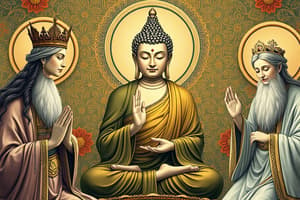Podcast
Questions and Answers
The concept of Anatta in Buddhism asserts the existence of a permanent, unchanging self.
The concept of Anatta in Buddhism asserts the existence of a permanent, unchanging self.
False (B)
Suffering in Buddhism is believed to be directly linked to the attachment to the concept of a fixed self.
Suffering in Buddhism is believed to be directly linked to the attachment to the concept of a fixed self.
True (A)
The five aggregates, or skandhas, consist of form, sensation, perception, mental formations, and consciousness.
The five aggregates, or skandhas, consist of form, sensation, perception, mental formations, and consciousness.
True (A)
Nirvana in Buddhism is reached by fully embracing the concept of a permanent self.
Nirvana in Buddhism is reached by fully embracing the concept of a permanent self.
Impermanence, as described in Buddhism, indicates that everything, including the self, is in a constant state of change.
Impermanence, as described in Buddhism, indicates that everything, including the self, is in a constant state of change.
Meditation and mindfulness practices in Buddhism help reinforce the notion of a fixed self.
Meditation and mindfulness practices in Buddhism help reinforce the notion of a fixed self.
Understanding the nature of non-self can lead to greater compassion and altruism in Buddhist practice.
Understanding the nature of non-self can lead to greater compassion and altruism in Buddhist practice.
The mental formation aggregate refers to physical sensations experienced by an individual.
The mental formation aggregate refers to physical sensations experienced by an individual.
Flashcards are hidden until you start studying
Study Notes
Buddha's Teachings On The Self
-
Anatta (Non-Self):
- Central concept in Buddhism that denies the existence of a permanent, unchanging self.
- Suggests that what we consider the self is merely a collection of changing physical and mental components (skandhas).
-
Skandhas (Five Aggregates):
- Form (Rūpa): Physical body and material forms.
- Sensation (Vedanā): Feelings and sensations experienced.
- Perception (Samjñā): Recognizing and interpreting experiences.
- Mental Formations (Samskāra): Volitions, habits, and mental states.
- Consciousness (Vijñāna): Awareness and cognitive processes.
- These aggregates combine to create the sense of self, but are impermanent and interdependent.
-
Suffering (Dukkha):
- The belief in a permanent self leads to attachment and suffering.
- Understanding the nature of non-self helps alleviate suffering by reducing attachment.
-
Impermanence (Anicca):
- Everything is in a constant state of flux; nothing is permanent, including the self.
- Recognizing impermanence can lead to detachment from the notion of a fixed self.
-
Nirvana and Liberation:
- Realization of non-self is key to attaining Nirvana, the ultimate goal in Buddhism.
- Liberation from the cycle of birth, death, and rebirth (samsara) is achieved by overcoming the delusion of self.
-
Meditation and Insight:
- Practices such as mindfulness and meditation are used to gain insight into the nature of self.
- Encourages direct experience of non-self and the interconnectedness of all beings.
-
Ethical Implications:
- Understanding non-self fosters compassion and reduces ego-driven actions.
- Emphasizes interconnectedness and the importance of altruism in Buddhist practice.
Buddha's Teachings On The Self
-
Anatta (Non-Self):
- Fundamental Buddhist principle denying a fixed, eternal self.
- Self is seen as a temporary collection of physical and mental components termed skandhas.
-
Skandhas (Five Aggregates):
- Form (Rūpa): Refers to the physical body and material objects.
- Sensation (Vedanā): Represents feelings, both pleasant and unpleasant.
- Perception (Samjñā): Involves the recognition and interpretation of experiences.
- Mental Formations (Samskāra): Encompasses volitions, habits, and various mental states.
- Consciousness (Vijñāna): Reflects awareness and cognitive processes.
- The aggregates together contribute to the subjective experience of self, but they are impermanent and interdependent.
-
Suffering (Dukkha):
- Attachment to the idea of a permanent self causes suffering.
- Grasping the concept of non-self helps mitigate suffering by lowering attachment levels.
-
Impermanence (Anicca):
- All phenomena, including the self, are transient.
- Awareness of impermanence can foster detachment from rigid self-identification.
-
Nirvana and Liberation:
- Realization of non-self is essential for attaining Nirvana, the ultimate spiritual goal.
- Liberation entails overcoming the illusion of self, breaking free from the cycle of samsara (birth, death, rebirth).
-
Meditation and Insight:
- Mindfulness and meditation practices are vital for deepening understanding of the self.
- They promote direct experiences that reveal the nature of non-self and interconnectedness among all beings.
-
Ethical Implications:
- Comprehending non-self nurtures compassion and reduces selfish, ego-based behaviors.
- Highlights the importance of altruism and interconnectedness in Buddhist ethical practice.
Studying That Suits You
Use AI to generate personalized quizzes and flashcards to suit your learning preferences.




